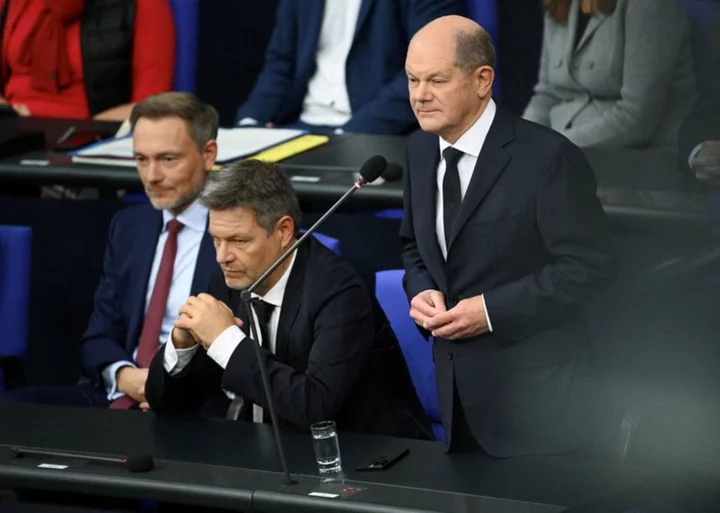By Holger Hansen
BERLIN (Reuters) -German Chancellor Olaf Scholz's government looks set to delay talks on next year's budget as it struggles to find a way out of a deepening crisis caused by a court ruling that has forced a freeze on new spending pledges.
A delay to the talks - scheduled for Thursday - would underscore the challenge facing the government after the country's constitutional court blocked a move to transfer 60 billion euros ($65.44 billion) in unused funds from the pandemic to green investments.
In a bombshell ruling last week, the court ruled the budget manoeuvre was incompatible with the debt restrictions enshrined in Germany's constitution.
The three parties in Social Democrat (SPD) Scholz's uneasy coalition with the Greens and pro-business Free Democrats (FDP) are trying to hammer out a solution to keep as many spending pledges as possible - and make them legally compliant.
With talks among politicians from all parties going on through the day, options include drawing up a supplementary budget for 2023 and suspending Germany's self-imposed debt brake before reinstating it for next year.
An email seen by Reuters from the head of the budget committee of the opposition conservatives, asked other members of the committee if they objected to cancelling Thursday's planned talks to thrash out next year's spending plans.
Such a move would probably mean next year's budget could not go to the Bundestag lower house of parliament next week which could increase uncertainty about spending in all areas of the German economy.
Highlighting the gravity of the situation, the government has already imposed a freeze on most new spending commitments.
It has also blocked spending from the 200 billion euro Economic Stabilisation Fund for this year, a letter seen by Reuters showed, and a government source told Reuters the government wanted to close the fund by the end of the year.
Almost every item of spending that has not yet been formally approved is up in the air. Among the uncertainties is aid for Ukraine. The government had planned to double military aid to Ukraine to 8 billion euros next year.
INDUSTRY URGES CLARITY
Greens Economy Minister Robert Habeck has warned that Germany's place as an investment hub is at stake, as well as jobs, and industry chiefs have called for clarity quickly.
"German industry is looking at the current political situation with the greatest concern," said Siegfried Russwurm, president of the BDI industry association.
The influential VDA autos association, which represents giants like BMW and Volkswagen as well as smaller suppliers, urged the government to provide a clear, reliable basis for planning as quickly as possible. The government must be "more committed and determined than before in pushing ahead with energy partnerships and trade and raw materials agreements to strengthen Germany as an industrial location," a spokesperson for the VDA said.
Trying to inject some reassurance, one government source told Reuters that the government would continue with its modernisation and economic transformation.
"This will not be called into question by the budgetary difficulties," said the source.
So far, Berlin has stuck by an agreement for 10 billion euros in subsidies with U.S. chipmaker Intel, which will develop two chipmaking plants.
A government source has told Reuters suspending the debt brake, which was lifted between 2020 and 2022 to cushion the impact of the COVID pandemic and Russia's invasion of Ukraine, would have to follow guidelines set out in the court ruling.
Finance Minister Christian Lindner has been reluctant to reform the debt brake, which restricts Germany's structural budget deficit to the equivalent of 0.35% of gross domestic product. His pro-business FDP are strong advocates of fiscal discipline and low taxes.
($1 = 0.9168 euros)
(Reporting by Holger Hansen, Christian Kraemer, Victoria Waldersee, Andreas Rinke; Writing by Madeline Chambers; Editing by Miranda Murray, Alex Richardson and Christina Fincher)

